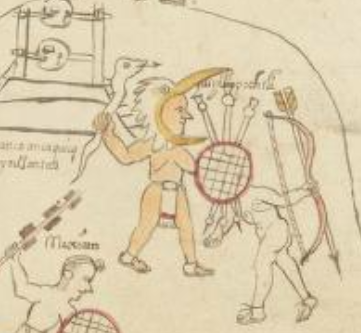Huitzilopochtli (Azca14)
This painted black-line drawing of an anthropomorphic figure of the divine force Huitzilopochtli provides a frontal view of the flesh-toned body, which is largely naked except for a loincloth, white (perhaps leather) sandals, and a head covering that is the head of a hummingbird (huitzilin) with its yellow beak open and the man-like face in profile, looking toward the right, peering out from inside the bird’s head. The bird has one visible eye, which is open, and the feathers on its head are white and spiky from the top of the head down to the neck area. In the figure’s right hand is an undulating serpent, head at the top, eye open, and a protruding tongue that looks like an arrow point. In the figure’s left (opochtli) hand is a circular, red bordered, shield with a mesh pattern. Visible at the top and bottom from behind the shield are three long arrow-like projectiles.
Stephanie Wood
The contextualizing image shows how Huitzilopochtli is here contending in battle with a naked man. Another appearance of Huitzilopochtli in this same manuscript, on Image 11), still has a human face peering out through the beak, but the rest of the body is more bird-like. In two examples from the Tira de la Peregrinación, where Huitzilopochtli is being carried on a migrant’s back, speech scrolls emerge from the beak. See below.
Stephanie Wood
guitzillopochtli
Huitzilopochtli
Stephanie Wood
post-1550, possibly from the early seventeenth century.
Jeff Haskett-Wood
conflictos, arcos y flechas, nombres de fuerzas divinas, colibríes, ondulante, ave, aves, pájaro, pájaros, pluma, plumas, animals, animales
Huitzilopochtli, the name of a very important divine force, https://nahuatl.wired-humanities.org/content/huitzilopochtli
Huitzilopochtli
Stephanie Wood
The Codex Azcatitlan is also known as the Histoire mexicaine, [Manuscrit] Mexicain 59–64. It is housed in the Bibliothèque Nationale de France, and hosted on line by the World Digital Library and the Library of Congress, which is “unaware of any copyright or other restrictions in the World Digital Library Collection.”
https://www.loc.gov/resource/gdcwdl.wdl_15280/?sp=14&st=image
The Library of Congress is “unaware of any copyright or other restrictions in the World Digital Library Collection.” But please cite Bibliothèque Nationale de France and this Visual Lexicon of Aztec Hieroglyphs.



